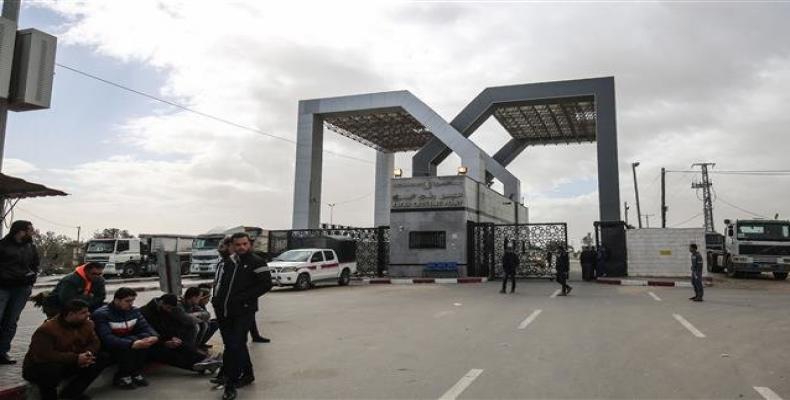Gaza City, January 9 (RHC)-- Egypt has blocked Palestinians from entering the country from the Gaza Strip after Palestinian Authority personnel left the Rafah border crossing and officers from the Islamic resistance movement Hamas replaced them, Hamas officials say.
Wael Abu Omar, a spokesman for the Hamas-run authority in charge of the border crossing, said on Tuesday that Gazans seeking to return from Egypt would still be allowed through but no one would be able to leave the Palestinian enclave.
The resistance movement says it took control of the crossing in a bid “to avoid a vacuum.” Brigadier General Yehya Hammad, the Hamas-appointed director of the crossing, said his men had completed their deployment and were ready to operate the passage.
After they took up their posts, the body of a Palestinian who had died in the Egyptian capital, Cairo, and two women accompanying the coffin were allowed to enter Gaza. The women's passports were stamped by Hamas officers.
Gazan travelers hoped that the Egyptian side would open the crossing permanently. "We hope the Egyptian side will open the crossing permanently as it did in the past to allow stranded patients, students, residents of third countries and humanitarian cases to travel," said Hammad, standing in the passport hall.
Upon arriving in Gaza, Hani Abu Sharekh, 48, said he hoped Egypt would soon resume full operation of the facility to allow passengers out of the coastal enclave. "There is no alternative to Rafah crossing, it is the only window for most of our people to travel and to seek treatment and education," Abu Sharekh said after returning from a trip to Cairo, where his wife had received medical treatment.
Human rights groups say Rafah, the only way for Gazans to leave the Palestinian enclave that bypasses Israel, has been the sole exit point from Gaza for an estimated 95 percent of its population of two million.
Israel has restricted the movement of Palestinians in and out of the Gaza Strip since the early 1990s. Restrictions intensified in June 2007, when Tel Aviv imposed a land, sea and air blockade on Gaza, citing security concerns.
Nearly two million Palestinians in Gaza remain locked in and are prevented from having free access to the remainder of Palestine and the outside world. The blockade has also undermined the living conditions in the coastal enclave and fragmented its economic and social fabric.
Egypt limits crossing Rafah for Palestinians of Gaza

Related Articles
Commentaries
MAKE A COMMENT
All fields requiredMore Views
- Ecuador's Electoral Debate: Luisa González urges Noboa not to lie to the people and keep his campaign promises
- Trump reportedly orders military to draw up plans to seize Panama Canal
- Bolivia demands sovereign access to the sea and begins a new stage in relationship with Chile
- Cuba to play women's soccer friendlies against Peru
- JFK files: CIA contaminated sugar destined for the Soviet Union

